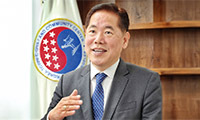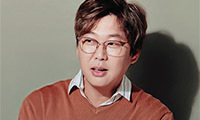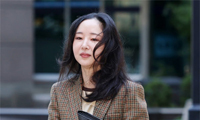Unique Korean Language Course Boon to Foreigners
▶ By Chung Hye-jean
The Silla, Koryo and Choson Kingdoms left behind in the city many historical sites worth visiting to view the Confucian and Buddhist legacy such as temples, pagodas, homes of noblemen and Confucian schools.
Now, Andong has more to add to its list of attractions. True to the city’s reputation as an educational city, Andong National University provides a competitive language course for both locals and foreigners.
ANULC (Andong National University Language Center) offers language courses in English, Japanese and Chinese. The center is especially proud of its STEP (Structured Total English Program), and eight-level program designed to provide systematic English instruction for ANU students and the general public as well.
With a staff of 2l native instructors, the center evaluates students through interviews and class participation to decide what level they should be in and whether they are ready to go on to the next level.
But what ANULC really takes pride in is the CLEP (Cultural and Language Exchange Program), which offers a chance for foreign students to learn not only the Korean language but also Korean tradition and culture, especially those pertaining to Andong.
Andong has many reasons to attract foreigners. It boasts more national treasures than any other city in the nation, with 239 items designated as either tangible or intangible cultural properties. There are also numerous artists and performers who preserve long-kept traditions in their works.
One of the most renowned cultural heritages of Andong is Hahoe Pyolshingut Talnori. Designated as Important Intangible Cultural Property No. 69, this mask dance satirizes the lifestyle of yangban, many of whom maintained their lavish lifestyles at the expense of ordinary people.
Even Queen Elizabeth came to Hahoe, the home of the mask dance when she visited Korea in April last year.
Chung Jong-soo, administrative head of ANULC and team leader of CLEP, said, “There are other Korean language courses at schools in Seoul, but we are the first to introduce a program that invites foreigners to learn the Korean language and experience Korean tradition and culture, while at the same time allowing Korean students to learn foreign languages and understand foreign cultures.”
Korean and foreign students practice with each other in combined language classes and siminars, often playing the role of teachers to their counterparts.
For cultural acitivities, foreign students visit several historical sites such as Hahoe Billage, Dosan Sowon (Confucian Academy), Andong Folk Museum and Pusok-sa Temple.
They also learn taekwondo, samulnori (ensemble of four traditional percussion instruments), mask dances and various Korean folk songs.
Furthermore, they have chances to visit Korean homes to better understand Korean lifestyle and tradition, and to attend cultural lectures on such topics such as Confucianism, social strata, traditional clothing and architecture.
Lee Yoo-jin, a Korean American student at Stanford University who took part in the fourth CLEP course in summer this year, said that the program gave him an opportunity to get in touch with his Korean self for the first time.
“Every day I experienced something new that my ancestors had been doing for hundreds of years. In addition, I learned about other aspects of Korean culture through my daily interaction with Korean friends,” he said.
ANULC is mapping out a wide range of new programs to expand its activities. It is set to open “Visit ‘n’ Know Korea”— a program that enables foreigners to learn the Korean language and experience Korean culture in cooperation with the city of Andong and Korea Natioinal Tourism Organization. Starting November, the center will provide a Korean language course to Chinese and Japanese students.
For more information, visit their website://lc.andong.ac.kr/eng.
스마터리빙
more [ 건강]
[ 건강]이제 혈관 건강도 챙기자!
[현대해운]우리 눈에 보이지 않기 때문에 혈관 건강을 챙기는 것은 결코 쉽지 않은데요. 여러분은 혈관 건강을 유지하기 위해 어떤 노력을 하시나요?
 [ 건강]
[ 건강]내 몸이 건강해지는 과일궁합
 [ 라이프]
[ 라이프]벌레야 물럿거라! 천연 해충제 만들기
 [ 건강]
[ 건강]혈압 낮추는데 좋은 식품
[현대해운]혈관 건강은 주로 노화가 진행되면서 지켜야 할 문제라고 인식되어 왔습니다. 최근 생활 패턴과 식생활의 변화로 혈관의 노화 진행이 빨라지고
사람·사람들
more
[한인단체 신년 인터뷰] 시니어센터 이현옥 회장… “풍성하고 아름다운 노년의 공간”
활발한 프로그램 운영과 높은 커뮤니티 참여로 지역 내 대표적인 커뮤니티 기관으로 평가받는 LA 한인타운 시니어&커뮤니티 센터(이하 시니어센터)…

변진섭 ‘희망사항’ 콘서트
센터메디컬그룹이 2026년 새해를 맞아 회원과 가족, 시니어를 위한 문화체험 공연으로 가수 변진섭 콘서트를 오는 2월27일(금) 오후 8시부터…
코윈 LA지부 ‘2026 골프 토너먼트’
세계한민족여성네트워크(KOWIN) LA 지부(회장 김주희)는 오는 2월2일(월) 캘리포니아 웨스턴 힐스 컨트리클럽에서 ‘골프 토너먼트 2026…
남가주 한국학원 새학기 교사연수회
남가주한국학원(이사장 박성수·교육감 신춘상)은 지난 10일 본부 강당에서 2025-26학년도 2학기 교사연수회를 개최했다. 이날 연수회에는 남…
[한인단체 신년 인터뷰] KYCC 송정호 관장… …
LA 한인타운 대표 비영리단체 한인타운청소년회관(KYCC)의 송정호 관장은 “지금 우리가 하는 일은 커뮤니티 ‘니즈’가 있기 때문에 존재한다”…
많이 본 기사
- 트럼프 “美시민에 사기친 귀화 이민자, 국적 불문 시민권 박탈”
- ‘민주당 잠룡’ 뉴섬 주지사 “캘리포니아 억만장자세 막을것”
- 멕시코, 베네수 기반 갱단원 체포…美와 정상통화 하루만
- 트럼프 “금주 후반, 의료보험 부담 완화 프레임워크 발표”
- ‘내란 우두머리’ 尹에 사형 구형… … 3
- 이스라엘, 미국 따라 유엔·국제기구 다수 탈퇴
- 빌 클린턴, ‘엡스타인의혹’ 하원 소환에 “매카시즘”이라며 불응
- 이란 사망 얼마나… “1만2천명 사망, 하메네이 발포령” 주장도
- 쿠팡 엄호 나선 美의원들 “美기술기업 차별·정치적 마녀사냥”
- 트럼프, 파월 겨냥해 “나쁜 연준 의장…곧 물러나길 바란다”
- 트럼프, ICE총격 파장 미네소타에 “범죄자 있는곳에 살고싶나”
- 1만2천달러에 中에 기밀 판 대가…美… 1
- 머스크-오픈AI 소송, 4월 시작… “속아서 투자” vs “억지 주장”
- 디인포메이션 보도…AI 개발보다 반도체 산업 보호에 무게 둔듯
- 뉴욕증시, 트럼프·은행 갈등에 불확실성 촉발…약세 마감
- “인터넷 차단된 이란서 머스크 스타링크 무료로 제공”
- 그린란드 총리 “미국 일부 되느니 덴마크에 남겠다”
- 박나래 또 의혹..집안일·산부인과 대리처방→약점 녹취 요구까지
- 한인 변호사가 ‘신탁자금 횡령’… 줄줄이 ‘중징계’
- 민희진, 용산구 아파트 가압류?..오케이 측 “확인 후 대응할 것”
- 트럼프, 이란과 대화 보류하며 反정부 시위대에 “기관 점령하라”
- 美, 무슬림형제단 이집트·요르단·레바논 지부 테러단체 지정
- 美, 밴스 주재로 덴마크·그린란드와 14일 백악관서 회담
- 세계 중앙은행장들, 파월 연준의장에 “전적인 연대” 성명
- 트럼프, ‘파월 수사’ 논란 속 “그가 일 잘한 건 확실히 아냐”
- 국적이탈에 2년이나 걸린다고…
- 트럼프, 그린란드 희토류 탐내지만… “채굴도, 정제도 어려워”
- 미 작년 12월 소비자물가 전년대비 2.7%↑…인플레 우려 경감
- 에어프레미아, 연중 최대 할인
- 월가, 트럼프 ‘카드금리 제한’ 추진에 법적대응 불사 시사
- ‘서부지법 난동 배후’ 혐의 전광훈 구속… “증거인멸·도망 염려”
- ‘낯설다’ 손흥민, 15년 만의 첫 ‘겨울 시즌’ 드디어 시작... ‘황제’ 메시와 맞대결도 ‘개봉박두’
- ‘투박 프로젝트’ 두근두근..방탄소년단 지민에 두 번째 러브콜 보낸 ‘R&B 전설’
- 뉴욕시 대형병원 간호사 노조 파업 돌입
- 2,000달러 ‘관세 배당’ 연소득 … 2
- MS “전기료 소비자에 전가 안해”…지역사회중심 데이터센터 강조
- 한국, 2살 어린 우즈벡에 0-2 충격패... U23 아시안컵 8강 ‘극적’ 진출
- 뉴저지 저소득 아파트 신청 일원화 된다
- “독감 심각…마스크 착용 의무화”
- 무서운 ‘독감’… 한인 5세 아동 사망
- 30년 평균 모기지 금리 5%대로 하락
- 강성연, 열애 고백 “싱글맘 NO, … 1
- 골프 카트 전복… 50대 남성 사망
- 李대통령 “日에 ‘한중일 협력’ 강조…조세이탄광 의미있는 진전”
- ‘김국진 아내’ 강수지 “ ‘프랑스 유학’ 딸 비비아나 ‘국제결혼?’, 안 된다 생각한 적 없다”
- 김경 15일 출석검토…태블릿·노트북 증거인멸 의혹 헛도는 경찰
- 방탄소년단, 드디어 베일 벗은 월드투어..4월 고양→6월 부산 간다
- ‘아메리칸 드림’이루려면 얼마나 있어야 할까? “504만 달러 필요”…1년새 60만 달러↑
- 세계은행, 올해 세계성장률 2.6%로 전망…관세여파속 소폭 둔화
- 트렌턴, 멜로스, 시실리, 레욱트라 1
1/5지식톡

-
 한국 안경을 무료 배송으로 받아보실…
0
한국 안경을 무료 배송으로 받아보실…
0안녕하세요. 서울 안암동에 위치한 ‘보고싶다 안경원’입니다.저희는 다년간 한국 고객분들께 착용감 좋은 안경테와 한국안경브랜드,고압축 도수 렌즈를 합리적인 가격에 제공해온 안경 전문점입니다.이번에 해외 배송이 가능해…
-
 미 육군 사관학교 West Poin…
0
미 육군 사관학교 West Poin…
0https://youtu.be/SxD8cEhNV6Q연락처:wpkapca@gmail.comJohn Choi: 714-716-6414West Point 합격증을 받으셨나요?미 육군사관학교 West Point 학부모 모…
-
 ☝️해외에서도 가능한 한국어 선생님…
0
☝️해외에서도 가능한 한국어 선생님…
0이 영상 하나면 충분합니다!♥️상담신청문의♥️☝️ 문의 폭주로 '선착순 상담'만 진행합니다.☎️ : 02-6213-9094✨카카오톡ID : @GOODEDU77 (@골뱅이 꼭 붙여주셔야합니다…
-
 테슬라 자동차 시트커버 장착
0
테슬라 자동차 시트커버 장착
0테슬라 시트커버, 사놓고 아직 못 씌우셨죠?장착이 생각보다 쉽지 않습니다.20년 경력 전문가에게 맡기세요 — 깔끔하고 딱 맞게 장착해드립니다!장착비용:앞좌석: $40뒷좌석: $60앞·뒷좌석 …
-
 식당용 부탄가스
0
식당용 부탄가스
0식당용 부탄가스 홀세일 합니다 로스앤젤레스 다운타운 픽업 가능 안녕 하세요?강아지 & 고양이 모든 애완동물 / 반려동물 식품 & 모든 애완동물/반려동물 관련 제품들 전문적으로 홀세일/취급하는 회사 입니다 100% …
케이타운 1번가
오피니언
 노세희 부국장대우·사회부장
노세희 부국장대우·사회부장 먼로 독트린과 돈로 독트린
 민경훈 논설위원
민경훈 논설위원트렌턴, 멜로스, 시실리, 레욱트라
 한형석 사회부 부장대우
한형석 사회부 부장대우 LA 시장 선거 구도와 선택지
 정유환 수필가
정유환 수필가 [화요칼럼] 어머님 전(前) 상서
 이왕구 / 한국일보 논설위원
이왕구 / 한국일보 논설위원[지평선] 다시 듣는 김광석
 박기섭
박기섭 ‘눈의 詩經’
 옥세철 논설위원
옥세철 논설위원‘좀비(zombie)체제’가 무너질 때…

돈로 독트린
 조지 F·윌 워싱턴포스트 칼럼니스트
조지 F·윌 워싱턴포스트 칼럼니스트 [조지 F. 윌 칼럼] 트럼프의 무면허 괴물 사냥
1/3지사별 뉴스

뉴욕시 대형병원 간호사 노조 파업 돌입
뉴욕시 대형병원 간호사 노조가 12일 전면 파업에 돌입했다. 임금인상, 인력 충원, 처우개선, 간호사 안전강화 등의 개편 요구가 받아들여지지 …
‘뉴욕시 무상 버스’ 올해는 물 건너간 듯

국적이탈에 2년이나 걸린다고…
선천적 복수국적자가 한국국적을 포기하고 미국 국적만 선택하는 ‘국적이탈’ 절차에 통상 2년이나 소요되는 것으로 확인됐다. 본보 기자가 지난 1…
“독감 심각…마스크 착용 의무화”

트럼프 압박에 파월 ‘발끈’…사상초유 대통령-연준의장 정면충돌
트럼프 대통령과 중앙은행 수장이 정면 충돌하는 사상 초유의 상황이 전개되고 있다.제롬 파월 연방준비제도(Fed·연준) 의장이 자신을 겨냥한 도…
살림으로 뿌리내리다- 테이크루트 안미정 대표의 요리 이야기 (9)

오늘 하루 이 창 열지 않음 닫기 


















































.png)


댓글 안에 당신의 성숙함도 담아 주세요.
'오늘의 한마디'는 기사에 대하여 자신의 생각을 말하고 남의 생각을 들으며 서로 다양한 의견을 나누는 공간입니다. 그러나 간혹 불건전한 내용을 올리시는 분들이 계셔서 건전한 인터넷문화 정착을 위해 아래와 같은 운영원칙을 적용합니다.
자체 모니터링을 통해 아래에 해당하는 내용이 포함된 댓글이 발견되면 예고없이 삭제 조치를 하겠습니다.
불건전한 댓글을 올리거나, 이름에 비속어 및 상대방의 불쾌감을 주는 단어를 사용, 유명인 또는 특정 일반인을 사칭하는 경우 이용에 대한 차단 제재를 받을 수 있습니다. 차단될 경우, 일주일간 댓글을 달수 없게 됩니다.
명예훼손, 개인정보 유출, 욕설 등 법률에 위반되는 댓글은 관계 법령에 의거 민형사상 처벌을 받을 수 있으니 이용에 주의를 부탁드립니다.
Close
x